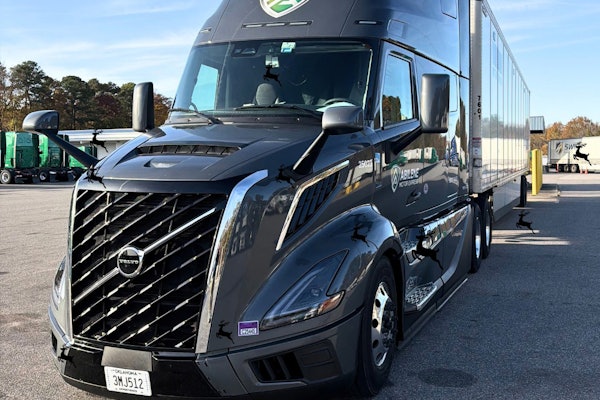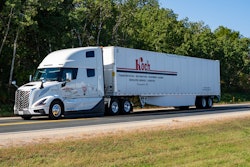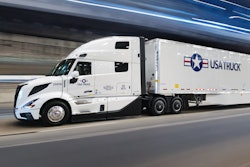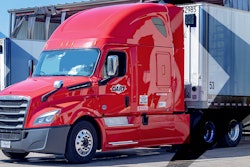The U.S. Senate on Tuesday, Sept. 11, approved a measure that would bar the Department of Transportation from spending money on a pilot program giving Mexican trucks access to U.S. highways, just days after the program began. The proposal is part of a $106 billion transportation and housing spending bill that the Senate hopes to vote on as soon as today, Sept. 12.
The House-passed version of the transportation funding bill (H.R. 3074) includes a similar, but not identical, provision. Given overwhelming support for those provisions in both the House and Senate, final adoption of a prohibition in the final transportation appropriations bill seems highly likely. But the Bush administration also might seek to water down the provision to allow a cross-border program to continue with limitations on scope or duration.
Senate Amendment 2797, which passed by a 74-24 vote, was sponsored by Sen. Byron Dorgan, D-N.D., and co-sponsored by several other senators, including Presidential hopefuls Hillary Clinton and Barak Obama. Supporters of the measure argued the trucks are not yet proven safe. “Why the urgency?” Dorgan asked. “Why not stand up for the standards that we’ve created and developed in this country?”
Sen. John Cornyn, R-Texas, who drafted a Republican alternative to Dorgan’s amendment, said the United States is applying tougher standards to Mexican trucks than to Canadian trucks and failing to live up to its North American Free Trade Agreement obligations. “I would never allow an unsafe truck on our highways, particularly Texas highways,” Cornyn said.
“Tonight’s decision by the Senate is a sad victory for the politics of fear and protectionism and a disappointing defeat for U.S. consumers and U.S. truck drivers,” said Federal Motor Carrier Safety Administrator John Hill. “This decision robs consumers of significant new savings, deprives drivers of new opportunities to compete in Mexico and squanders millions in taxpayer dollars Congress has spent to put in place a sophisticated safety network for border crossings.”
The Owner-Operator Independent Drivers Association thanked the Senate for its decision. “Congress has said enough is enough,” said Todd Spencer, OOIDA executive vice president. “They’re tired of the administration’s efforts to force the pilot program on the American people. Our nation’s safety and security should never be put at risk.”
Teamsters General President Jim Hoffa also praised the Senate’s vote. “The American people have spoken, and Congress has spoken,” Hoffa said. “Now it’s time for the Bush administration to listen. We don’t want to share our highways with dangerous trucks from Mexico. On the sixth anniversary of the 9-11 terror attacks, I’m sure every American is relieved that the Senate voted to make sure that potential threats to national security aren’t allowed to travel freely on our highways.”
President Bush threatened to veto the transportation funding bill, partially because the bill includes the amendment to halt funding for the program. “The administration strongly opposes any language imposing further restrictions on the cross-border trucking demonstration project,” the White House announced Tuesday, Sept. 11. “The administration reiterates its commitment to the Congress that it has the necessary safeguards in place to ensure a safe and secure program.”
Litigation continues in two separate appelate courts. The government has until Friday, Sept. 14 to respond to an emergency motion from OOIDA in the U.S. Court of Appeals for the District of Columbia Circuit to shut down the program, followed in the coming months with pleadings on OOIDA’s petition for review. And other opponents of the program, including the Sierra Club, the Teamsters and Public Citizen, are filing briefs by Nov. 19 in their ongoing litigation in the U.S. Court of Appeals for the 9th Circuit in San Francisco. The government’s brief is due Dec. 17.
At about 12:50 a.m. CT Saturday, Sept. 8, the first Mexico-domiciled truck authorized under the Bush administration’s pilot program to transport cargo within the United States cleared federal inspections at the U.S. border in Laredo, Texas, bound for North Carolina. Transportes Olympic became the first Mexican carrier authorized to operate in the United States beyond the so-called commercial zone as part of the program.
Meanwhile, the Mexican government approved El Paso, Texas-based Stagecoach Cartage and Distribution as the first U.S. trucking company to operate in Mexico.
The Teamsters and other critics of the program charge that it would allow trucks and drivers that do not meet American standards on the nation’s roads. Their complaints include that not enough inspectors exist to inspect every Mexican truck, lack of Mexican drug testing facilities and that Mexican trucks don’t meet U.S. safety standards. Also, they fear for American jobs, as Mexican truckers work far cheaper than their American counterparts.
The House previously had tried several times in recent months to block the program. The Committee on Transportation and Infrastructure approved H.R. 1773, the Safe American Roads Act of 2007, 66-0 on May 2; the House passed it 411-3. The legislation allowed a three-year pilot program, but only under specific conditions and once all prerequisites are met to ensure safety. The bill, which included mechanisms to shut the program down if there is any detrimental effect on safety, also required Congress to pass additional legislation for the border to open fully beyond the limited pilot program.








